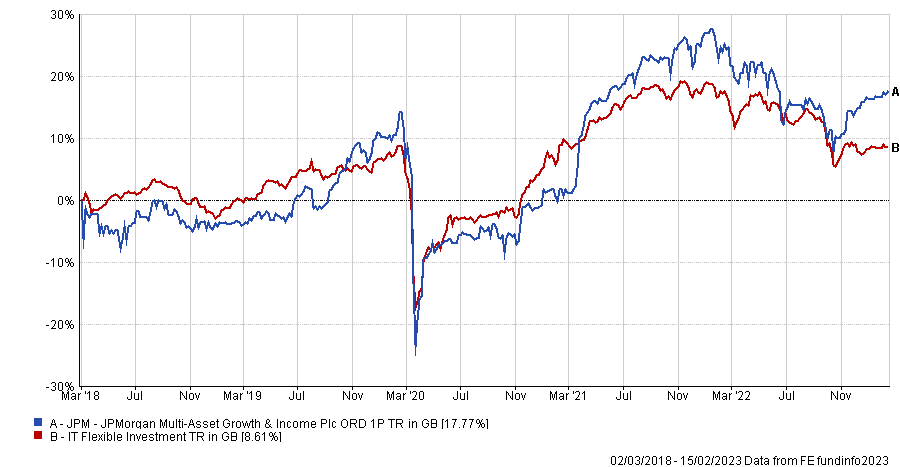The JPMorgan Multi-Asset Growth and Income trust was launched in 2018 with the goal of making an annual return of 4.5%, but this reasonably challenging target was not enough for manager manager Gareth Witcomb and the trust’s board.
Indeed, despite difficult market conditions in recent years they decided to increase the performance target to 6% in an attempt to keep up with rising base rates.
While this new target will be tough, the trust has shown it is capable of strong returns, beating its peers in the IT Flexible Investment sector by 9.2 percentage points since inception, climbing 17.8%.
Here, the manager tells Trustnet how he intends to meet this goal over the long-term and why emerging market equities appear more attractive than those in the US.
Total return of trust vs sector since launch

Source: FE Analytics
What is your investment process?
The objective of the portfolio is to deliver a 6% return on an annualised basis, and we want to do that with a lower volatility than you'd get from equity markets – around two thirds less.
We've outlined the types of assets and weighting to those assets that we think you need in a portfolio to achieve that type of return.
We think you need around 53% into world equities and around 7% in the emerging markets, bringing the total equity content of around 60%. The rest we have in bonds as well some alternatives.
How successful have you been at achieving that 6% return?
We haven't returned 6% annually since inception. We've been through some pretty difficult market environments since the trust first appeared in March 2018.
We're made around just over 4.5% annually from a total return perspective, but it’s worth remembering that we changed the benchmark – it used to be a target of 4.5%
Why did you increase the hurdle when conditions were already difficult?
We probably need to think about pushing that above 6% given that base rates have moved, especially as they’ll probably surpass 4% in the UK.
Ultimately, we felt that a more simple benchmark was appropriate, and 6% seemed a lot more suitable.
It’s been a difficult start for us, but we think that we can deliver that 6% or more over the next 10 to 15 years.
If you look back at the returns, we've had some years where we've done extremely well and others where we've done less well but we think that 6% over the medium term is achievable.
How have you shifted allocations to reach that target?
We had preference for value equities over growth equities that worked really well for us. Overall, we’ve been taking down equity allocations meaningfully, but we’re starting to rebuild that.
We’re still a bit cautious of the risks there, although we’ve been a little bit more optimistic about the ability of the US to avoid recession.
Now, we've started shifting more into growth equities, adding to duration and adding to emerging market exposure, because that’s really where we are see opportunities.
I think one of the things we got right was stepping away from fixed income, but we’ve started rebuilding risk there. I’d be really surprised if fixed income didn’t produce some kind of positive return this year.
Will you expand that emerging market exposure?
At the moment, we have about 50% of the portfolio in equities and a fifth of that is in emerging markets. We're using the China A Shares fund that is on our platform to get exposure specifically to China itself, which has performed really well over the past six months, so we think there is a really good opportunity there.
The China reopening story has happened a lot quicker than we thought and that potentially provides a lift to assets in in Asia, especially in China itself. I can certainly see our emerging markets exposure going higher.
We’re concerned about earnings in the US and it’s really been underperforming, so that’s a place we’ve been less constructive.
Are you concerned at all by geopolitical tensions there?
China is focusing very much on moving away from zero-Covid at the moment and that’s causing lot of hardship with the death toll so high.
I couldn't in all honesty tell you that I have any more insights on this than anyone else, but I think it’s reasonable to say they have more pressing issues to be dealing with in the near term at least.
What were the biggest contributors to performance?
Being in short European fixed income was certainly a big contributor. What was so different last year was just that returns from fixed income assets were so negative at the same time as equities were.
Infrastructure also provided a boost because the underlying cash flows are inflation linked, so that’s been a success story.
In hindsight, I wish we'd have had a much bigger holding there than we did, but unfortunately we only had a modest position so it wasn't enough to offset losses in the in the portfolio.
What detracted from performance the most?
Our exposure to equities. If you had any equities last year, you're likely to have had negative returns, but again, hindsight is the best investment tool.
We came into the year pretty constructive on risk, but that certainly hurt us, especially when you think about the invasion of Ukraine etc.
What’s your outlook on equities now?
We would argue that they are now looking more attractive. In the long-term, I think it’s a really exciting time to be a 60/40 investor because you could get some of the best returns you’ve had in a number of years.
Whilst we remain slightly cautious about earnings expectations being too high and a slowdown in growth, I think there are some pockets of optimism that we can point to.
What are your interests outside of fund management?
My ideal day would probably consist of playing a bit of sport like squash and walking my dog on a beach.





